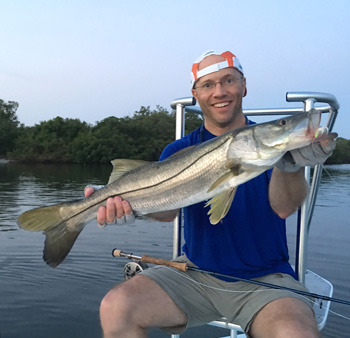Fishing with guides

rusty chinnis | sun
Paul Heinold, a visitor from Virginia, holds a nice snook he caught on
fly. Heinold was fishing with Captain Chris Hargiss.
Fishing with a guide is an excellent way to get a new appreciation of local waters, and can be indispensable in an area you're not familiar with. When you fish with a local guide, you get an entrée to his/her extensive knowledge of where to find fish and a unique introduction to the natural world around you. Guides know where the best opportunities for action are while introducing you to some of the area's most beautiful natural assets.
Guides aren't just for novice anglers. Many experienced anglers regularly fish with guides. They know that there is no substitute for the local knowledge gained from being on the water on a regular basis. Then there's the convenience of stepping on a boat, being taken to the fish, having the guide fillet fish, if you decide to keep any, and not having to clean the boat.
Many people have the mistaken impression that guiding is an easy job, while only a few really understand the hard work of a long day on the water. These men and women strive to provide experiences that last a lifetime, while working tirelessly to protect the valuable resources that we all too often take for granted.
It's a demanding process for a charter captain to get his or her license in the first place. Licenses are issued by the United States Coast Guard only after applicants have completed a battery of tests that are formidable. First they must show proficiency in their knowledge of the rules of the road, which includes knowing nautical light combinations, whistle signals, fog signals and maritime conventions in both international and inland waters. They must also be skilled in charting and plotting courses on nautical charts. Other areas of expertise they are required to master include boat handling, electronic navigation, fire prevention, understanding weather, passenger and crew safety and marlin spike seamanship (knot tying),. Once they pass the test they are drug tested, must take a first aid course, document 720 hours on the water and obtain a maritime security card.
I've learned a lot of what I know fishing with guides, and they have saved me countless hours of frustration. Tips like how to prevent a backlash, how to remove one if you get one, finding fish by looking for signs that may not be intuitive and how to remove a hook with a barb from your hand have proved invaluable.
Today there's a new cadre of young guides joining the seasoned veterans that surprise me with new places to fish, new ways to target certain species and techniques that produce quality fishing. I'm amazed at the skill and knowledge they display. Guides are trained professionals that will help you catch fish and teach you lessons they've learned over years of hard work on the water.
If you haven't had the pleasure of a day on the water with one of the many professional guides in our area, I would encourage you to give it a try. Split a trip with friends, and you're guaranteed to get your money's worth and much more. The best way to find a competent guide is by word of mouth or consulting a local tackle shop. Good fishing!

